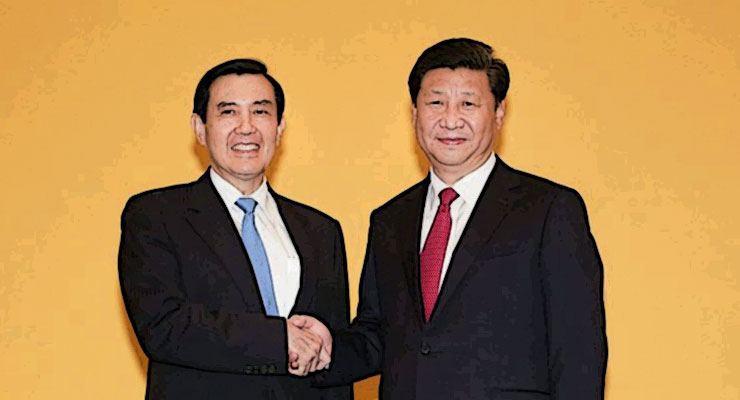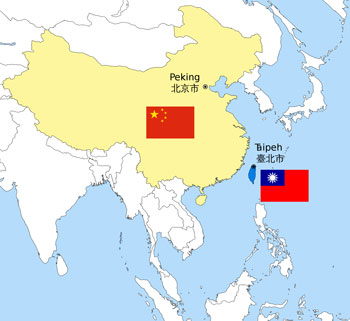
Last week the small, landlocked West African nation of Burkina Faso severed diplomatic relations with Taiwan – Republic of China – in favor of the People’s Republic. It was a little known sign of the times, part of a larger, longer dynamic in East Asian politics and a move pursuant to the One China Policy. That’s a long standing unofficial compromise which serves the interests and trade of both Taiwan (ROC) and the People’s Republic of China (PRC). It’s a gripping show with realpolitik lessons for contentious international situations elsewhere.
The policy says that everybody accepts there is One China, but few say openly which one is the China, except the People’s Republic and Taiwan, both of whom claim to be it.
For 70 years this has resulted in an entertaining diplomatic game where there’s one level for rich countries and another level for the poor. Countries like the US and Japan have an embassy in Beijing and then something like an embassy in Taipei usually called a “Trade Office” or similar synonym. These pseudo-embassies issue visas and do all the things a real embassy does but as a legal fiction aren’t “official.”

Poor counties, particularly some tiny coral reefs with flags in the Pacific and obscure African ones play a profitable game in all this confusion given they’re stuck with recognizing one China, and only one. This exclusivity is enforced by China, note, not Taiwan. Sometimes they’ll recognize one for a decade or so and reap all kinds of aid, infrastructure improvement and direct investment. Then there’ll be a change of government, or just a better offer from the other China and one Chinese flag in a dusty far off capital will come down, its diplomats sent home and the national press will about-face in favor of their new Chinese sponsor. This is followed by a flurry of statements as the other Chinese flag and diplomats arrive. It really depends on which is paying the most.
For both Chinas the rewards are ample. The amount per “inducement” to switch recognition is the kind of pocket change the People’s Republic or Taiwan can find under their sofas: tens of millions sometimes. But selling their recognition and playing embassy switcheroo is huge to the recipients. The winning China gets a new BFF, albeit an obscure one, and a chance to be the slightly more “legitimate” China. For Taiwan this recognition is precious as the trend in the face of massive People’s Republic money is for Taiwan to be recognized in fewer and fewer countries. This century its all been one way in the People’s Republic’s favor. Before Burkina Faso flipped last week, in the past year alone the Dominican Republic, Sao Tome and Panama did so leaving Taiwan recognized by only 18 countries. Sometimes this happens often: Gambia, for example, has flipped recognition three times to date.
Another spoil is friendly votes at the UN, not a currency to be sniffed at: rich countries basically buying other countries’ votes at the UN is a powerful geopolitical tool. The whole corruption of UN votes for cash is even more absurd in other contexts, like landlocked countries which trade Japanese Yen for UN-voting approval of whaling, to pick a good example. The Japanese admitted as much decades ago and the game continues apace. How many whales do you think landlocked Zimbabwe hunts with no navy and a merchant fleet of two canoes and a floaty?
Taiwan doesn’t have Beijing’s heft even though it’s been fully democratic for 30 years. As far as good global citizenship goes, Taiwan is the first country in Asia to allow gay marriage and they’ve just started phasing out all nuclear power, yet the People’s Republic block their participation and even their observer status in all the international forums they can.
Still on the Taiwanese side, for the moment, are some tiny Pacific states; Nauru, Tuvalu, Palau, Solomon Islands, dusty African left-behinders like Swaziland as well as various Central American states such as Nicaragua, Honduras and Belize.
For beach fun, Taiwan is a full diplomatic partner with both St. Vincent and St. Lucia. These countries have little “real” trade with Taiwan but sure love the New Taiwan Dollar. Suspiciously, these same Caribbean flyspecks playing the Taiwan-China game also sell pro-whaling votes to Japan: a horrifyingly fact given they are both dependent on a balanced marine environment for exports, tourism and food. At what price one’s sovereignty, diet and national dignity? Looking at you: Saints Lucia, Kitts, and Vincent. Whaling votes for Yen culprits in the Pacific include shady Nauru and the Solomon Islands, also players of the two China game.
The battle goes on outside diplomatic spheres also. Several months ago Beijing was steamed at various US travel and apparel companies listing “Taiwan” as a country separate from China in their online drop down menus.
One way to look at all this is that Beijing and Taipei are treating desperate, poor countries like pawns and trading them for pocket change in a cynical tit for tat. Another reading is powerless nations are cravenly playing each China off against the other.
These squabbles may seem absurd and petty, but the peace has stuck for 70 years without a shot fired and indeed incredible economic benefits inuring to both Chinas and their partners abroad. Would that other conflicts like the Israeli-Arab, Persian Gulf, or two Koreas mess be so well handled as cross China Strait relations have been.
David Anderson has no diplomatic relations with Taiwan or China.
Leave a Reply